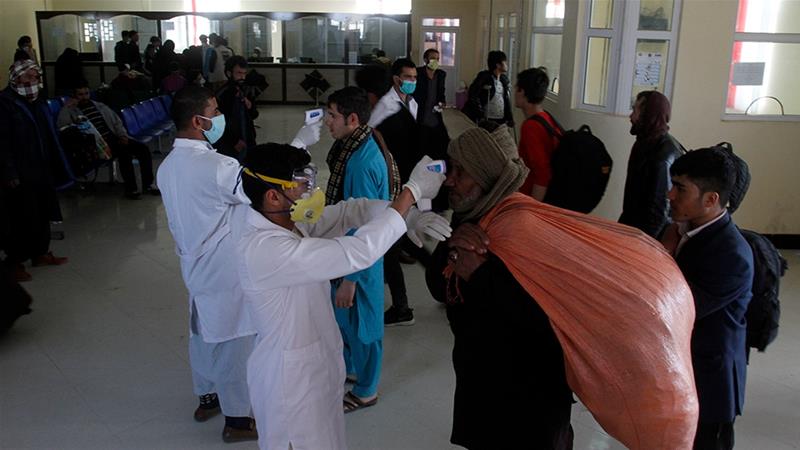Pandemic a major test of Afghanistan’s crisis management
https://arab.news/y3kna

The coronavirus disease (COVID-19) pandemic that has engulfed the globe has already spread to most parts of Afghanistan. As of Monday, the Afghan Ministry of Public Health reported the total number of confirmed cases in the country to be about 1,000, with about a 3 percent fatality rate. But the official statistics are by no means representative of the actual number of those infected, which might be several times higher.
The main reason for the apparently limited number of coronavirus cases in Afghanistan is partly due to the extremely low capacity for testing nationwide. The only laboratory that is able to confirm if a test is positive or negative is in the capital, Kabul. The hospital, specifically for coronavirus patients, was established with assistance from the government of Japan.
COVID-19 initially spread to Afghanistan from neighboring Iran, which is the regional epicenter of the pandemic. Tens of thousands of Afghans have entered the country from Iran during the past two months, mostly via land routes, transmitting the infection largely in Herat, Kandahar and Kabul, with a limited number of cases in almost every province of the country. The first case was confirmed in late February.
Afghanistan has a broken and dysfunctional health care system. Most Afghans travel to neighboring Pakistan and some to India for medical treatment. Turkey is also becoming a new destination for medical tourism for some Afghans who can afford the costs. Despite millions of dollars in foreign aid for the health sector, the country doesn’t have a single hospital that can provide reliable diagnostic and treatment services. Public hospitals are overburdened and lack quality. Hundreds of private hospitals have been established over the past 18 years, but they lack expertise and adequate facilities, forcing most Afghans to travel abroad for medical help. Each year, Afghans spend millions of dollars on medical treatment abroad. This is damaging for the country’s economy, but patients have no other option to save their lives. Thus, Afghanistan has been confronting the pandemic with an extremely poor health care system in place.
Meanwhile, Afghanistan’s agricultural sector has been severely impacted by the past several decades of war and conflict. Despite the fact that substantial foreign assistance has been provided to revitalize agricultural productivity, the efforts have been ineffective so far and the country depends on imports from neighboring countries for essential food commodities. In the wake of the ongoing pandemic, food prices have skyrocketed due to a significant reduction in imported supplies. If Afghanistan is to put an end to its reliance on food imports, it has to pay proper attention to rehabilitating its agricultural sector through strategic national programs instead of project-based, short-term solutions that have failed to achieve the national objective of food self-sufficiency.
The country has a destitute economy and mostly relies on foreign aid, with the US being the main financier. During the coronavirus outbreak, it is virtually impossible for Afghanistan to cope with the economic shocks on its own. However, the World Bank, Asian Development Bank, the EU and others have offered to provide financial support in order for the country to tackle the situation. The UAE provided tens of thousands of urgently needed test kits. But Afghanistan has been facing the pandemic during a time of economic hardship after the US last month announced it was cutting $1 billion of financial aid due to its unhappiness over unresolved differences between President Ashraf Ghani and former Chief Executive Dr. Abdullah Abdullah.
The country doesn’t have a single hospital that can provide reliable diagnostic and treatment services.
Ajmal Shams
It is critically important for the Afghan government to properly utilize the funding allocated for addressing the pandemic crisis, whether from domestic resources or international assistance. These funds are to be used either directly for health care or indirectly for coping with the economic impacts of the crisis. It is a test for the Afghan administration to ensure that it is capable of managing crises. Genuine leadership is proved in difficult times.
Most major Afghan cities have been under lockdown for the last several weeks, and the decision to order this was both timely and appropriate. Without such restrictions, the infection could have spiraled out of control. But many Afghans are still critical of the measures taken by the government as being too little, too late. However, with a fragile economy, continuing violence and a broken health care system, the actions the government can take are very limited. In order for Afghanistan to defeat the coronavirus, both people and the government must join hands to ensure a coordinated response.
- Ajmal Shams, based in Kabul, is president of the Afghanistan Social Democratic Party. He was a deputy minister in the national unity government, and served as policy adviser to Ashraf Ghani before his presidential bid. Twitter: @ajmshams









































